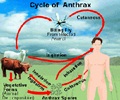US anthrax scientist who committed suicide fearing arrest over anthrax deaths of 2001 was actually a sociopathic, homicidal killer, psychiatrists have testified.
US anthrax scientist Bruce E Ivins, who committed suicide fearing arrest over anthrax deaths of 2001, was actually a sociopathic, homicidal killer, psychiatrists have said.
Therapist Jean C. Duley had testified on July 24 that Bruce E. Ivins described a "detailed homicidal plan" to kill his co-workers after learning he was going to be indicted on capital murder charges, CNN reports.Sources told the TV channel that prosecutors might indeed have sought the death penalty against Ivins.
Five people died and dozens more became ill after letters containing the anthrax bacteria were sent to congressional offices and media organizations soon after the September 11, 2001, terrorist attacks.
Duley testified that Ivins had been diagnosed as a "sociopathic, homicidal killer" by several top psychiatrists.
During a recent group therapy session, Ivins said he had bought a bullet-proof vest and obtained a gun after learning of the pending charges, Duley said.
"He was going to go out in a blaze of glory," testified Duley, who said that Ivins also threatened her.
Advertisement
He was due in court Thursday.
Advertisement
Ivins worked for decades in the U.S. Army Medical Institute of Infectious Diseases’ biodefense lab at Fort Detrick, Maryland. He was trying to develop a stronger vaccine against the deadly anthrax toxin.
The FBI had traced the anthrax used in the attacks to the lab using a new genetic technology, a U.S. official said.
The Ames strain of the anthrax spore that was used in the 2001 attacks was commonly used in U.S. government labs. Scientists said creating a "weapons grade" form of anthrax is a complex process requiring extensive professional expertise.
Authorities were looking at whether Ivins may have released anthrax as a way to test a vaccine he was working on, another said.
Kemp, who said his firm had represented him for more than a year, said he was disappointed that Ivins "will not have the opportunity to defend his good name."
"For six years, Dr. Ivins fully cooperated with that investigation, assisting the government in every way that was asked of him," Kemp said.
Kemp said Ivins was innocent and blamed his death on the investigation.
"The relentless pressure of accusation and innuendo takes its toll in different ways on different people, as has already been seen in this investigation," Kemp said. "In Dr. Ivins’ case, it led to his untimely death."
But there were other versions. One report said that the scientist might have stood to gain financially by the anthrax scare - he was a co-inventor on two patents for a genetically engineered anthrax vaccine. Besides he had been listed as one of two inventors of another biodefence-related product.
Thomas Ivins, elder brother of the deceased scientist, presented a rather unflattering picture of him, saying his brother used to strut around as if he was omnipotent and that he had stayed away from him.
“He had caved in under pressure. I’m not surprised,” Thomas Ivins said, shrugging his shoulders.
Source-Medindia
GPL








